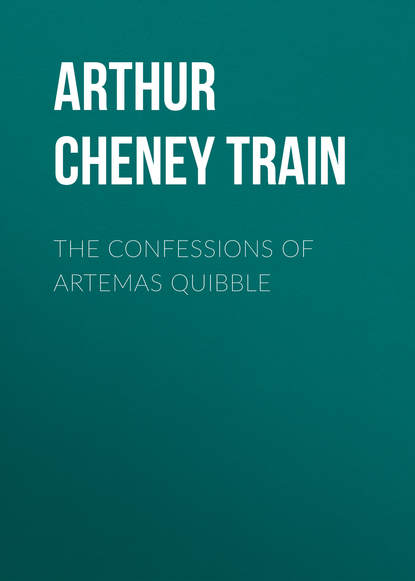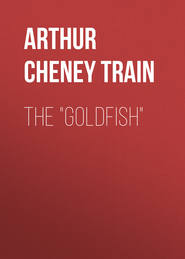По всем вопросам обращайтесь на: info@litportal.ru
(©) 2003-2024.
✖
The Confessions of Artemas Quibble
Настройки чтения
Размер шрифта
Высота строк
Поля
"See here," I interrupted, "do you seriously mean that except for fifty dollars or so there is nothing coming to me out of my grandfather's estate? Why, he was worth over a million!"
"That is exactly what I mean," he returned. "He left you nothing except an allowance for your education during your good behavior. He made me the judge. I'm your trustee and I can't conscientiously let you have any more money to drink up and gamble with. It's over and done with." He rapped with an air of finality on his desk with the little bronze horse.
"Who gets all the money?" I asked ruefully.
"The Society for the Propagation of Free Thinking," he answered, eyeing me sharply.
"I should think anything like that ought to be contrary to law!"
I retorted. "It ought to be a crime to encourage atheism."
"It's a good devise under our statutes!" he answered dryly. "I suppose your own faith is beautiful enough, eh?"
I did not respond, but sat twisting my hat in my hands. Through the open window the soft damp odors of spring came in and mingled with the dusty smell of law books. So this was law! It suddenly struck me that I was taking the loss of over a million dollars very resignedly. How did I know whether the old boy was telling me the truth or not? He had drawn the will and got a good fee for it. Certainly he was not going to admit that there was anything invalid about it. Why not study law—I might as well do that as anything —and find out for myself? It was a game worth playing. The stakes were a million dollars and the forfeit nothing. As I looked around the little office and at the weazened old barrister before me, something of the fascination of the law took hold of me.
"I rather think I should like to study law myself," I remarked.
He looked at me out of the corners of his bead-like little eyes.
"And break your gran'ther's will, mebbe?" he inquired slyly.
"If I can," I retorted defiantly.
"That would be better than fighting cocks and frittering your time away with play actors," said he.
"Mr. Toddleham," I returned, "if I will agree to turn over a new leaf and give up my present associates, will you continue my allowance and let me stay on in Cambridge and study law?"
"If you will agree to enter my office and study under my supervision —yes."
Once more I glanced around the little room. Somehow the smell of decaying leather did not have the same fascination that it had exercised a few moments before. The setting sun sinking over the Probate Office entered the window and lingered on the stern old face of the Hon. Jeremiah Mason over the fireplace. The birds twittered gayly amid the branches by the window. Spring called me to the open air, to the world outside, to the future.
"Give me fifty dollars and my ticket to New York," said I.
It had so happened that at the time of my visit to Mr. Toddleham my credit, and consequently my ready funds, had become so reduced that I had only a dollar or two in my pocket. Therefore the check for fifty dollars that the old gentleman had carefully drawn for me with his quill pen and then had as carefully sanded over was by no means inopportune. I took the shore-car back over the Warren Avenue Bridge, depressed at the thought of leaving the scene of my first acquaintance with the world and at the same time somewhat relieved, in spite of myself, by the consoling thought that I should no longer be worried by the omnipresent anxiety of trying to escape from duns and Jews.
Resolved to terminate my collegiate career in a blaze of glory, I went the rounds of the college buildings and bade all my friends to a grand celebration at the Tavern, where, owing to the large amount of trade that I had been able to swing to it, my credit was still good. Even "Buck" de Vries was not forgotten, and without a suggestion of my contemplated departure I entertained my colleagues royally with a bowl of punch brewed after a celebrated Cambridge recipe, which in a decadent age spoke eloquently of the glories of the past. I was in the midst of a highly colored speech—during which I must confess de Vries had eyed me in a somewhat saturnine manner—when the proprietor tapped me on the shoulder and said that I was wanted outside. Excusing myself I stepped to the door only to be unexpectedly confronted by the local sheriff, who apologetically informed me that he held a warrant of attachment for my worldly goods and another for the arrest of my very worldly person. With admirable presence of mind I requested his patience until I should find my coat, and returning via the buttery made my escape from the premises by means of the rear exit. Sic gloria transit! That night I slept under the roof of the amiable Quirk in Methuen, and the day after reached New York, the city of my future career.
CHAPTER II
My arrival in the metropolis was unaccompanied by any newspaper comment or by any particular excitement on the part of the inhabitants. I simply landed, after a seven hours' journey from Boston, with a considerable quantity of fine raiment—rather too fine, as I soon discovered, for the ordinary uses of a serious-minded, working youth—some fifty odd dollars, and a well-developed bump of self- confidence that was supported by a strong reserve resolution not to let anybody get ahead of me. I had all the assurance of a man double my years and an easy way of making acquaintances that was destined to stand me in good stead, but I do not wish to be understood as admitting that my manners were offensive or that I was in any degree supercilious. I was simply a good fellow who had always enjoyed the comradeship of other good fellows, and as a result felt reasonably sure that the rest of the world would treat him kindly. Moreover, I could dissemble without difficulty and, if occasion arose, could give the impression of being a diffident and modest young man, ready and anxious to order himself "lowly and humbly before his betters."
Yet I had seen enough of the world to know that unless a man puts a high appraisal upon his attainments and ability no one else is likely to do so, and that the public takes one, nine times out of ten, at his own valuation. Coming on the clay itself: I wore my hair rather long, with an appreciable modicum of bear's grease well rubbed in, side whiskers and white beaver, and carried a carpet bag on which was embroidered a stag's head in yellow on a background of green worsted. And the principal fact to be observed in this connection is that, instead of creating a smile as I passed out of the Grand Central Station, I was probably regarded as a rather smart and stylishly dressed young man.
I had a card to some young actors in the city, given me by my Thespian friends in Boston, and it proved but a short trip on the horse-cars down Fourth Avenue to the locality, near the Academy of Music, then as now frequented by the fraternity. I began my professional career, then, by taking lodgings in an actors' boarding- house, and I am free to confess that at the time I was undecided whether to follow the bar or the boards. I have since frequently observed that the same qualities make for success in both, and had it not been for the fact that I found my new friends somewhat down at the heels and their rate of emolument exceedingly low, as well as for a certain little incident to be recounted shortly, I might well have joined the group of future Booths and Forrests that loitered along the near-by Rialto, looking for jobs as Roman soldiers or footmen in some coming production.
But the change from my well-appointed lodgings in Cambridge and my luxurious surroundings at the Cock and Spur to a distinctly shabby theatrical boarding-house, where the guests plainly exhibited traces of the lack of proper ablutional facilities and the hallways smelt of cabbage and onions, was a distinct shock to my highly sensitive tastes. However, my new acquaintances proved warm-hearted and hospitable and did everything in their power to make me feel at my ease, with the result that in spite of the cabbage and the wooden slats that served as springs in my bed—which nearly filled the rear hall bed-room I had hired for one week at four dollars and twenty-five cents—I resolved to postpone entering upon an active career until I should know the city better and have made a few friends.
Those of my new comrades who were lucky enough to have employment did not rise in the morning until the neighborhood of twelve o'clock, and those who had no employment at all followed their example. I thus found myself adopting of necessity, as it were, the pleasant practice of sauntering out on Broadway after a one o'clock breakfast, and of spending most of the afternoon, evening, and following morning in or about the same locality. We usually went to some theatrical show on what was known as "paper," and I afterward joined my actor friends at a restaurant, where we sang songs and told stories until the gas-lamps were extinguished and gray dawn crept over the house-tops. Downtown—into the mysterious district of Wall Street—I did not, as yet, go, and I might still be haunting the stage entrances of the theatres had it not been for an adventure in which I was an involuntary participant.
It so happened that among my new acquaintances was a careless, rattle-brained youth known as Toby Robinson, who in spite of some histrionic ability was constantly losing his job and always in debt. He was a smooth-faced, rather stout, good-natured-looking person, of the sort who is never supposed to have done harm to anybody. Not long before he had enjoyed a salary of fourteen dollars per week, but having overslept several times running he had been discharged for absence from rehearsals. He had reached the limit of his resources about the time of my arrival in the city and had been in a most lugubrious frame of mind when I first had the honor of his acquaintance. Suddenly, however, he appeared one day with a large roll of bills and entered upon a period of lubrication and open-handed hospitality, in which we all participated. During this season of good cheer, as Toby and I were strolling down Broadway one afternoon, an ugly looking man who had been following us stepped forward and, touching my friend on the shoulder, said gruffly:
"The captain wants to see you."
The uttering of these cryptic syllables produced a most extraordinary effect upon my companion, for he turned deadly pale and the perspiration collected in beads upon his temples, while he commenced to wring his hands and bemoan his ill fortune.
"What is the trouble?" I inquired in great solicitude.
The belligerent stranger, however, pushing between us, grasped Toby firmly by the arm and marched him across the street, while I trailed behind in the nature of a rear guard. I had already begun to suspect that the ugly man was none other than an officer of the law, and visions of myself locked up in jail as a possible accomplice, although innocent of wrong-doing, hovered in my mind. Toby, giving every indication of guilt, slouched along beside his captor, occasionally glancing shamefacedly over his shoulder.
We were now nearing a police station, and our companion, for the first time showing any sign of personal interest, inquired if we had a lawyer. On receiving a negative reply, the officer strongly recommended our immediately retaining counsel in the person of one Gottlieb, who could be found across the street from the police station and whose precise whereabout were made obvious by means of a large sign about six feet by three and one-half in size, reading as follows:
ABRAHAM GOTTLIEB'S LAW OFFICE NOTARY DEEDS RENTS COLLECTED BAIL BONDS INSURANCE GENERAL ADVICE
Without giving Toby time for consideration the officer led us across the street and into the stuffy little den occupied by the lawyer.
"Here's the gent I told you of," said he, nodding in the direction of a hawk-faced little man smoking a vile cigar, who was sitting with his feet upon a table. "I'll leave you alone," he added, and sauntering across the threshold, took his stand in front of the window outside.
"Howdy," remarked Gottlieb, without arising or removing his cigar. "Mike tells me you're charged with obtaining money by false pretences."
"What!" gasped Toby, grasping the table for support. "False pretences!"
"Flying a bit of bad paper, eh? Come now, didn't you cash a check on the Cotton Exchange Bank for about six hundred dollars when there was only fifteen on deposit? Don't try to bluff me. I know your sort. Lucky if you don't get ten years."
"Save me!" wailed Toby. "Yes, I did cash a check, come to think of it, for that amount, but I had no idea my account had run so low."
Mr. Gottlieb spat into a sawdust box under the table and winked with great deliberation.
"How much have you got left?" he inquired indifferently.
Tony delved into his breeches and with trembling hands produced a roll of bills still of some dignity. Gottlieb stretched forth a claw, took them, placed them in his own pocket, and then swung his feet to the floor with alacrity.
"Come on, my lads," he exclaimed, "and I'll show you how we get the sinners off! All right, Mike." And he led the way across the street and into the station-house, where poor Toby was searched and his pedigree taken down by the clerk. It being at this time only about eleven in the morning we were then conducted to the nearest police court, where we found in attendance the unfortunate hotel keeper who had so unwisely honored Toby's check.
"You rascal!" he shouted, struggling to reach my unfortunate friend. "I'll show you how to take other people's money! I'll put you where you belong!" But the officers haled him back and he was forced to restrain himself until the could tell his story to the judge. This, it so happened, was not to be for several hours, and during this interval Gottlieb mysteriously vanished and as mysteriously reappeared. It was half after three before the judge announced that he would take up Toby's case. Now, the judge looked even more of a rascal than did Gottlieb, which was paying his Honor a high compliment, and I suspect that it was for this reason that the complainant had in the meantime sent round for his own lawyer to represent him. We were now pushed forward and huddled into a small space in front of the rail, while the lawyers took their places upon the platform before us.
"Your Honor," began the lawyer for the hotel man, "this fellow here has swindled my client out of six hundred dollars by inducing him to cash a worthless check."
"What have you to say, Mr. Gottlieb?" asked the judge.
"Confession and avoidance, your Honor," replied the attorney, with what appeared to me to be the slightest possible drawing down of his right eyelid. "Confession and avoidance. We admit the fact, but we deny the imputation of guilt. My client, Mr. Robinson, whose abilities as an actor have no doubt hitherto given your Honor much pleasure, was so careless as to forget the precise amount of his bank account and happened to draw a check for too large an amount. No one was more surprised and horrified at the discovery than he. And his intention is at once to reimburse in full the complainant, whose action in having him arrested seems most extraordinary and reprehensible."
"Your Honor," interrupted the other lawyer, "were there the slightest possibility of any such outcome I should be glad to withdraw the charge; but, as a matter of fact, this person is a worthless, lazy fellow who has not a cent to his name, and who induced my client to cash his check by leading him to believe that he was a man of substance and position. No doubt he has spent the money, and if not we might as well try to squeeze it out of a stone. This fellow is guilty of a crime and he ought to be punished. I ask your Honor to hold him for the grand jury."
"Well, Mr. Gottlieb," remarked the judge, "tell me, if you can, why I should not lock your client up. Did he not falsely pretend, by requesting the complainant to cash the check, that he had money in the bank to meet it?"
"By no means, your Honor," answered Gottlieb. "The proffering of a check with a request for money thereon is merely asking that the money be advanced on the faith that the bank will honor the demand made upon it. One who cashes a check does so at his own risk. He has a full remedy at civil law, and if the bank refuses to pay no crime has been committed. This is not a case for the penal law."
"That seems reasonable," said the judge, turning to the other. "How do you make this out a crime? What false pretence is there in merely inviting another to cash a check?"









